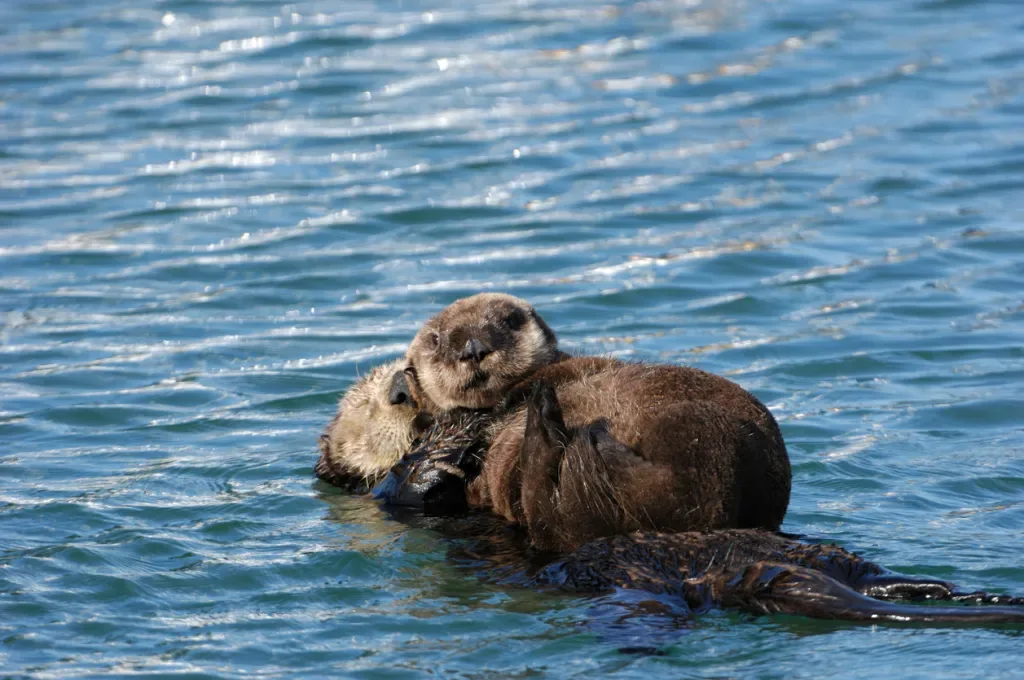Otter attacks are so rare they’re nearly unheard of. Most people adore these cuddly-looking mammals that play, swim, and look totally harmless.
But these charming little creatures do pose a threat to humans, as three women recently learned. Sharp teeth and deceptive strength mean encounters can result in injury or even death.
Today, we’re learning all about these animals and how to stay safe when you encounter them.
Let’s dive in!

3 Injured in Jefferson River, Montana Otter Attack
We usually think of otters as cute, snuggly critters who like to hold hands. But this wasn’t the story for a group of women who recently experienced an otter attack in Montana.
Three women spotted two otters in the water while tubing on the Jefferson River near Cardwell. One of the otters ended up attacking the women. While two had minor injuries, a third was rushed to a local hospital for emergency treatment.
Montana’s Fish, Wildlife, and Parks Department maintains signs that warn people about the presence of otters. In a statement, officials said several factors may cause an otter to attack humans. They reminded the public to keep a safe distance from all wildlife to avoid injury.
Which Otter Species Live in Montana?
North American river otters are common across the US, including Montana. These cuddly-looking mammals are closely related to weasels. Known for their heavy tails and sleek bodies, they can grow as long as 47 inches. An adult otter weighs up to 20 pounds.
At one time, these furry swimmers were a rare sight. Their numbers fell in the middle of the 20th century due to problems like excessive trapping and pollution. But thanks to sound environmental practices, their population is increasing. Seeing an otter is a sign that a river is generally healthy since they prefer clean water.
These animals have impressive, unique skills. Thanks to their incredible ability to conserve oxygen, they can spend up to four minutes underwater. They’re powerful swimmers and can travel as fast as six miles an hour.
They also love to play with each other! You might find them playing some of the same games humans do, including tag and hide-and-seek. It’s more common to see these playful creatures in pairs than alone.
Watch out for bears too! Bear Attacks Continue in This National Park.
Are Otter Attacks Common?
These animals have a generally good reputation. After all, how often do you hear about otter attacks?
Otter attacks are nearly unheard of because they’re exceedingly rare. Only 44 incidents have been reported internationally since 1875. According to those numbers, you’re more likely to be struck by lightning than become the victim of an angry otter.
These events are infrequent because otters tend to avoid areas populated by humans. You won’t find them near big cities or river ports. These cute creatures usually keep to themselves, hunting for fish and watching their young.
Most otter attacks occur when humans get too close to these river-dwelling animals. While they aren’t usually aggressive, they’ll lash out if threatened. A mother protecting her pups might be extremely hostile.
Love otters? It’s safer to pet this instead of the real thing: Sea Otter Plush Toy.

What Are the Risks Associated With Otter Attacks?
Although otter attacks are incredibly rare, you should take them seriously. These adorable animals can pack quite the punch when defending themselves.
Always seek immediate medical attention if bitten by an animal. No matter the situation, these bites come with a risk of infection. You never know where that critter has been or what it’s been doing, especially if it’s a wild animal.
Otters are known carriers of multiple diseases. Some have assailed humans who later tested positive for rabies. They can also transmit tetanus, a bacterial infection. It’s particularly important to seek treatment for animal bites if you don’t have a current tetanus booster.
Otter attacks can be dangerous for other reasons, too. These creatures are carnivores with sharp, pointed teeth. Even if an otter is disease-free, its bite alone may cause blood loss or tissue damage.
What To Do if an Otter or Other Wild Animal Attacks You
Imagine you’re swimming in a cool river on a warm summer day. Out of nowhere, a river otter approaches and attacks you. You fight off the animal and swim to shore. What should you do next?
If the injury is severe, call 911 immediately. Apply pressure to the wound to stop the bleeding, then wash the area with water and soap if possible. You can use an over-the-counter antibacterial cream like Neosporin to treat the bite. Cover the area with a bandage or gauze to protect it.
Once the bite is treated and bandaged, make an appointment with your doctor. Depending on your injury, they may recommend tests or prescription medications. X-rays, stitches, or surgery may be necessary for severe wounds.
Finally, contact your local animal control department after any attack. They may decide to capture, isolate, or relocate the critter if it poses a threat.
It’s not just wildlife that can hurt you: 5 Surprisingly Common Causes of Injury While RV Camping.
Stay Safe and Respect the Wildlife
River otters usually live up to their reputation as adorable, fun-loving animals. After all, not many animals play hide-and-seek. But just like any wild animal, an otter will attack if the conditions are right.
It might be tempting to approach these furry little creatures in the wild. Unfortunately, getting too close may result in catastrophe. Remember to give them the same space and consideration you’d offer a fellow human. They’re simply trying to live peacefully with their families, just like us.
We’ll Help You Find the Best Free Camping in the USA
You should give it a try!
As a matter of fact, these free campsites are yours to enjoy. Every time you pay federal taxes, you’re contributing to these lands.
Become a FREE CAMPING INSIDER and join the 100,000 campers who love to score the best site!
We’ll send you the 50 Best Free Campsites in the USA (one per state). Access the list by submitting your email below: